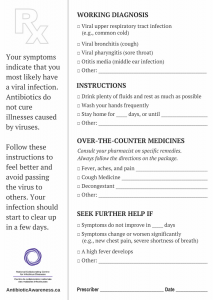
Antimicrobial resistance (AMR) refers to changes in infectious organisms (viruses, bacteria, fungi and parasites) so that they can no longer be controlled or treated effectively by standard drugs such as antibiotics, antivirals and antifungals.
AMR is an increasingly serious threat to public health and NCCID is working with partners across the country to provide evidence and resources on AMR surveillance and antimicrobial use (AMU).
Antibiotic Awareness Week
Unnecessary use and misuse of antibiotics and other antimicrobials is increasing the serious problem of antimicrobial resistance (AMR) in Canada and around the world. Resistant microbes make infections much harder or impossible to treat. Antimicrobial Awareness Week (formerly Antibiotic Awareness Week), held November 18 – 24 every year, promotes informed, careful use of these life-saving medicines to help keep them working for future generations.
What’s New
No Stewardship without Stewards: Resourcing Your Antimicrobial Stewardship Program
Join us for a review of the challenges, successes, and best practices in resourcing antimicrobial stewardship programs.
Turning the Tide on Resistance: Local Leaders, National Goals for Antimicrobial Stewardship
Join us for a panel discussion highlighting progress on antimicrobial stewardship in three provinces and exploring ways to move forward on shared commitments to tackling antimicrobial resistance.
Small but Mighty: Promoting Antimicrobial Stewardship Activities in Rural Locations
Join us for a webinar discussing the efforts to promote antimicrobial stewardship interventions in rural locations in Canada. We will hear from a senior pharmacist in rural Saskatchewan about her experiences in promoting more appropriate antimicrobial use in the local area. Bring questions or add comments based on your experience of AMS in rural settings to help broaden perspectives.
The Farm & AMR: Antimicrobial Resistance and Antimicrobial Use in Food-producing Animals
Dr. Jan Sargeant helps build our One Health understanding of AMR in this episode focused on antimicrobial resistance and antimicrobial use in Canadian food-producing animals. The episode highlights how veterinarians and producers are working to use antibiotics responsibly, gains made, challenges that remain, and key interventions that could do more to preserve the effectiveness of antimicrobials for people and animals alike.
One Health 101 – Understanding the Connection Between Humans, Animals, and the Environment in the Fight Against AMR
Dr. Jane Parmley joins NCCID for our opening episode of the Getting to Know OH mini-series to help introduce the fundamentals of the One Health concept and its relevance for public health decision-making. Dr. Parmely shares her views on the timeliness and value of a One Health approach to current challenges addressing the complex problem of AMR, as well as inspiring examples of where it is being applied.
Drop the Label: Penicillin Allergy de-Labelling is for Everyone
Pen-allergy de-labelling can be a powerful antimicrobial stewardship tool, clarifying options available to prescribers selecting the most appropriate antibiotic for their patients. Join leads in the BC-based multidisciplinary ‘Drop the Label’ initiative as they share successes and challenges in developing, implementing, and scaling up patient education and clinical tools to support prescribers serving people with potential antibiotic allergies.
Resources
Viral Prescription Pads
Provides information about symptomatic relief for infections and indicates when patients should consider a return visit. To be used with patients (adults and children) who have a suspected viral infection.
Download below or order free copies of prescription pads, here.

Surveillance of Antimicrobial Resistance and Antimicrobial Utilization in Canada
REPORT
There have been important expansions within existing national surveillance programs (Canadian Nosocomial Infection Surveillance Program and the Canadian Integrated Program for AMR Surveillance), with new data integration and reporting by the Canadian AMR Surveillance System. However, important gaps in the AMR/AMU surveillance “patchwork” in Canada must be addressed to make it a comprehensive, integrated, One Health program.
Our review highlights 3 crucial areas for action:
- development of a complete, integrated AMR/AMU surveillance program that builds on current success;
- changes in federal-provincial-territorial policies to compel standardized AMR/AMU reporting; and
- investment in AMR/AMU surveillance resources (dedicated personnel, funding, and enabling structures and policy).
Notable Publications
Events
No Stewardship without Stewards: Resourcing Your Antimicrobial Stewardship Program
Join us for a review of the challenges, successes, and best practices in resourcing antimicrobial stewardship programs.
Turning the Tide on Resistance: Local Leaders, National Goals for Antimicrobial Stewardship
Join us for a panel discussion highlighting progress on antimicrobial stewardship in three provinces and exploring ways to move forward on shared commitments to tackling antimicrobial resistance.
Small but Mighty: Promoting Antimicrobial Stewardship Activities in Rural Locations
Join us for a webinar discussing the efforts to promote antimicrobial stewardship interventions in rural locations in Canada. We will hear from a senior pharmacist in rural Saskatchewan about her experiences in promoting more appropriate antimicrobial use in the local area. Bring questions or add comments based on your experience of AMS in rural settings to help broaden perspectives.
The Farm & AMR: Antimicrobial Resistance and Antimicrobial Use in Food-producing Animals
Dr. Jan Sargeant helps build our One Health understanding of AMR in this episode focused on antimicrobial resistance and antimicrobial use in Canadian food-producing animals. The episode highlights how veterinarians and producers are working to use antibiotics responsibly, gains made, challenges that remain, and key interventions that could do more to preserve the effectiveness of antimicrobials for people and animals alike.
One Health 101 – Understanding the Connection Between Humans, Animals, and the Environment in the Fight Against AMR
Dr. Jane Parmley joins NCCID for our opening episode of the Getting to Know OH mini-series to help introduce the fundamentals of the One Health concept and its relevance for public health decision-making. Dr. Parmely shares her views on the timeliness and value of a One Health approach to current challenges addressing the complex problem of AMR, as well as inspiring examples of where it is being applied.
Drop the Label: Penicillin Allergy de-Labelling is for Everyone
Pen-allergy de-labelling can be a powerful antimicrobial stewardship tool, clarifying options available to prescribers selecting the most appropriate antibiotic for their patients. Join leads in the BC-based multidisciplinary ‘Drop the Label’ initiative as they share successes and challenges in developing, implementing, and scaling up patient education and clinical tools to support prescribers serving people with potential antibiotic allergies.





